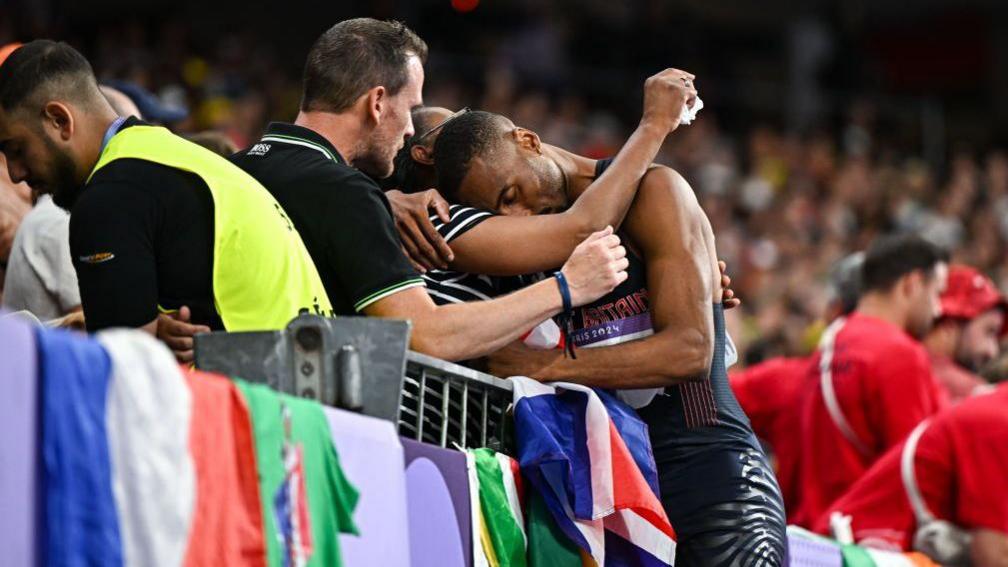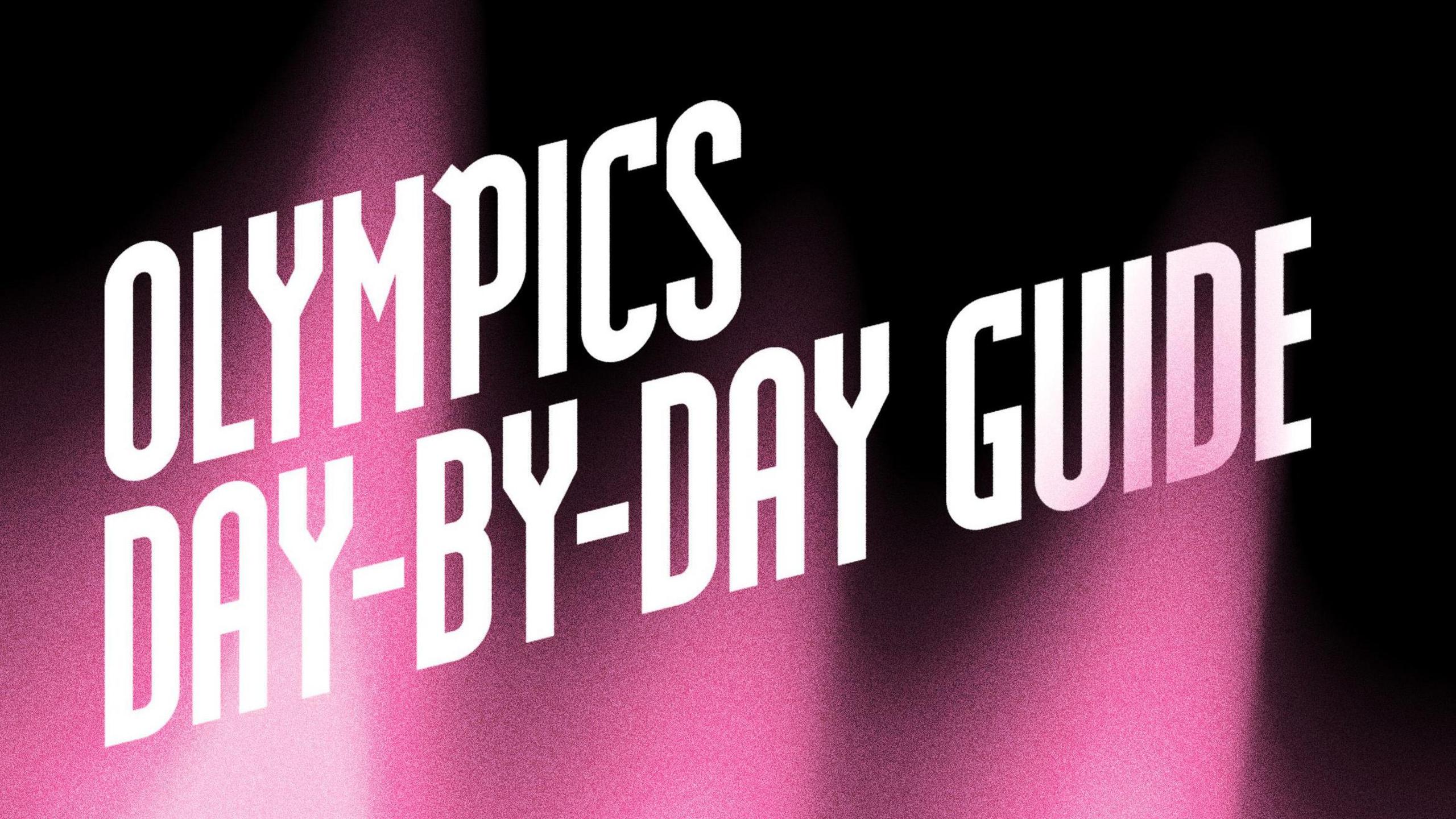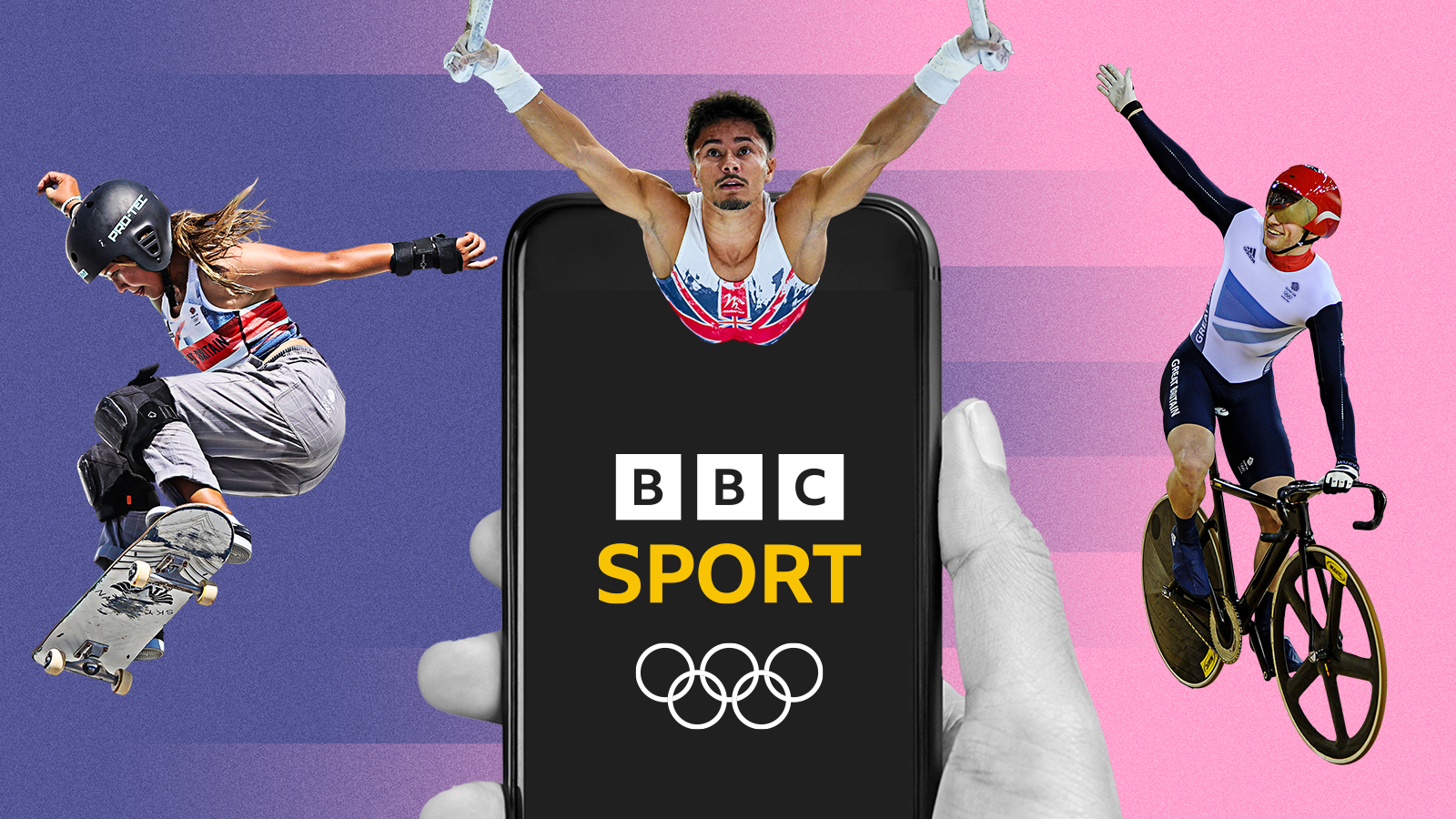I want to shock the world - Hudson-Smith
Hudson-Smith narrowly misses out on gold
- Published
Warning: This article contains a reference to suicide
When the greatest prizes are decided by mere fractions, perspective is everything.
Matthew Hudson-Smith knows that as well as anyone.
When the Olympics took place three years ago, the Briton could not have foreseen his rise to the Olympic podium at Paris 2024.
At his lowest moment, he did not see a way forward at all.
Despite everything that life has thrown at him, the 29-year-old could barely have gone closer to a magnificent golden triumph at the Stade de France.
He was beaten to the line by a mere four-hundredths of a second by American Quincy Hall on Wednesday, 12 months after a margin of 0.09 separated him and Jamaican gold medallist Antonio Watson at the World Championships.
Hudson-Smith led until the final strides of a thrilling men's 400m final, producing a European record as five athletes ran under 44 seconds in the same race for the first time in history.
A complicated mixture of feelings struck an emotional Hudson-Smith, still fixated on winning gold but ultimately not allowing the bigger picture to go unnoticed.
"Sometimes, the journey is better than the outcome," he told BBC Sport.
"It has been one hell of a journey and I am just grateful."
Hudson-Smith secures silver medal in men's 400m final
It is 10 years since the course of Hudson-Smith's life changed.
Once an academy footballer at Wolves but then working at a supermarket, he received a late call-up to the 2014 Glasgow Diamond League and seized his opportunity by running under 45 seconds for the first time.
He went on to win European silver at the age of 19 and, driven to maximise his potential, he undertook a significant change in 2017 when he relocated his training to Florida and temporarily lived with US sprint star Noah Lyles.
That move came after he placed last in the final on his Olympic debut in Rio, his presence at those Games a remarkable feat itself after recovering from several stress fractures to make the team.
Just a year later he won his first individual international title at the European Championships - but that was where his promising trajectory was abruptly halted.
A series of physical issues led him to accrue substantial debt due to medical costs and a loss of sponsors, before injury ended his hopes of competing at the Tokyo Olympics.
Those events coincided with the Covid-19 pandemic and Hudson-Smith struggled with his mental health through three years of “absolute hell” as he remained isolated from his family in the United States.
But it was not until the 2022 World Championships, overcome with emotion after claiming his first individual global medal, that he revealed the true depths of his darkest days.
At his lowest, Hudson-Smith attempted suicide.
Speaking after winning his Olympic silver, Hudson-Smith said: "I saw everyone in the crowd, they were all proud.
"They know what I have been through. They know that it has been a rough journey.
"Incredible highs and deep, deep lows."
Michael Johnson analyses men's 400m final
Hudson-Smith has undeniably backed up his claim in 2022 that world bronze was “just the beginning”.
However, he has still had setbacks to overcome.
His 2023 season was wrecked by Achilles tendonitis, suffering to the point he was taken off the track in a wheelchair at the London Diamond League one month before last year’s Worlds.
It was through a combination of guts, determination and undeniable talent that Hudson-Smith, no stranger to pushing on through pain, still managed to upgrade to silver in Budapest.
Despite his limited preparations, he was far from satisfied, and he has had his eyes fixed on Olympic gold ever since.
The signs had been extremely promising all year. A European record in May, improved to 43.74 seconds in London just six days before the opening ceremony in Paris.
That formidable form had been on show throughout the rounds, and so it was again in the final as he became the fifth-fastest 400m runner in history, clocking 43.44.
But running within 0.41 seconds of Wayde Van Niekerk's world record was still not enough.
Former Olympic 400m champion Christine Ohuruogu, who Hudson-Smith has described as his "guardian angel", said on BBC Radio 5 Live: "Matthew Hudson-Smith did nothing wrong, Quincy Hall ran beautifully. He came like a steam train.
"Silver medal, European record, brilliant time. These are not slow times. I know Hudson-Smith will feel disappointed but I hope he will take heart from the fact that he worked it right to the line, he gave it everything he could.
"It was a good race, it's just how it ended up today. What a result to go home with.”

Matthew Hudson-Smith embraced members of his family after winning Olympic silver
Hell-bent on achieving gold in Paris, Hudson-Smith has become meticulous in his preparations, while crucially managing to remain injury-free.
That has included more gym work and, as he revealed after his record-breaking London Diamond League run last month, even eating salads.
Evidently it has worked. He has shaved close to a second off his personal best this year as he continues to build towards a global crowning moment.
"I said that if you are going to take it from me, you are going to have to really take it from me, and that is exactly what he did," Hudson-Smith said.
"It's sport. It's a crazy one. They [the crowd] know what is to come. The world does as well.
"I will keep building on this. I want to shock the world.
"It's a matter of time."
In Budapest 12 months ago, Hudson-Smith crouched on the track in a moment of contemplation. In Paris, he yelled at the big screen.
But once the immediate disappointment faded, his attention turned to more important matters, sharing an emotional embrace with family members by the track after completing a remarkable turnaround in both his career and life.
And still, a golden vow remains.
"This is just the start and I know there is a bigger time in there," said Hudson-Smith.
"This is the healthiest I have been going into a championship and I almost got it.
"When it clicks, it is going to be special.
"It didn't come at this Olympics but [give me] another four years."
If you have been affected by the issues raised in this article, help and support is available via BBC Action Line.
Related topics
- Published10 August 2024

- Published26 July 2024

